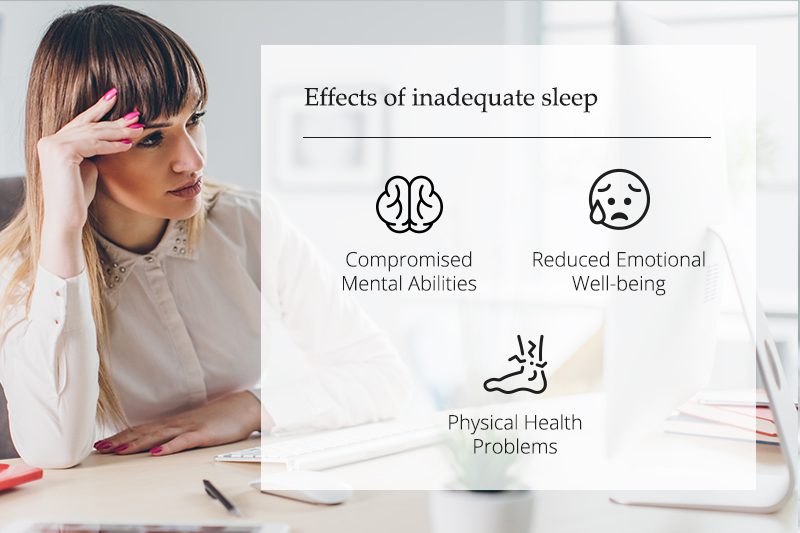
Cutting corners on sleep can seem like a good idea until you become run down. Regardless of how busy you are, becoming sleep deprived can compromise your health, your mood, overall safety and your relationships with others.
To get a better understanding of just how important sleep is, let’s take a look at the findings of research on the matter. Then, we’ll share tips and tricks on how to make the most of the time that you can dedicate to sleep (even when it’s not much).
Why adequate sleep is important
In a March 2016 survey conducted by the Sleep Health Foundation in Australia, it was found that nearly half of adults have at least two sleep-related problems (such as sleepiness in the day, having a hard time falling asleep or waking up throughout the night). The main cause of these problems was said to be competing demands for people’s time. When life gets busy, people are cutting out sleep hours to make more time in their day.
What are the actual consequences you should be concerned about when sleep is cut short?

Compromised mental abilities
First, sleep is required for optimal brain function. When performing tasks like learning, solving problems, paying attention or being creative, all become compromised when you don’t get enough sleep. It becomes harder to focus and stay alert, which leads to confusion and the impairment of logical reasoning.
Furthermore, the processing and storing of memories occurs throughout different stages of sleep, so a lack of sleep can cause you to be more forgetful. Though you may be able to work longer by sacrificing sleep, it doesn’t necessarily mean you will be more productive. It’s probable that your work quality will deteriorate. You’re also likely to experience lack of motivation and increased difficulty making decisions.
Reduced emotional well-being
In addition to the impact on mental function, a lack of sleep can cause emotional problems. Research has found that even partial sleep deprivation is correlated with an increase in negative emotions like anger, sadness, stress and exhaustion. When sleep was increased, dramatic mood improvements resulted. Another study tested 10,000 people and found that those with insomnia were five times more likely to develop depression and twenty times more likely to develop a panic disorder.
Ensuring the right amount of sleep will help you to feel more balanced and positive so you can enjoy your work and life as a whole.
Physical health problems
It’s more than just your mind and emotions that need sleep; your entire body requires rest for proper maintenance and recovery. Here are some of the important functions performed during sleep:
- Healing and repairing of the heart and blood vessels
- Balancing of hormones that regulate hunger
- Regulation of blood sugar levels
- Enabling the proper function of the immune system
Without enough sleep, you can develop imbalances which eventually lead to serious health conditions such as obesity, type 2 diabetes, heart disease, hypertension, cancer, depression and an increased risk of mortality.
In summary, sleep is important for the proper functioning of the mind, emotions, and body. The more sleep is lost, the worse the consequences get.
Tips for getting quality sleep
If your job is highly demanding or has periods of urgency, you will likely be increasingly tempted to cut corners on sleep. However, the costs will quickly catch up.
David Cunnington, Sleep Physician and Director at the Melbourne Sleep Disorders Centre, says, “Getting sufficient sleep is a key to health at all ages.” He explains that people need to recognise sleep as a priority, rather than an inconvenience. It is a shift from thinking you’ll just fit sleep in when you can to ensuring you get an adequate amount by taking purposeful action.
Let’s take a look at what you can do to get the best quality sleep even when you are short on time.
Set boundaries with work
One of the interesting findings of the Sleep Health Foundation’s survey is the correlation between sleep problems and people working during the hour before bed. More than half of those who do so, have two or more sleep problems.
With this knowledge, it’s recommended to set boundaries for work. Stop working at least an hour before you go to bed and, instead, spend that time relaxing and winding down. While it may seem like you will miss out on getting more done, without proper sleep, you will be hampering your productivity the following day.
Watch your diet
Your dietary habits can also play a role in how well you sleep. One of the most impactful substances, according to the survey’s findings, is caffeine. When you aren’t feeling well-rested, you may turn to coffee or some other type of caffeinated beverage for energy. While this can give you a boost, the equivalent of over six caffeinated drinks in one day correlated with a 20% increase in the likelihood of sleep problems. If you are going to consume caffeine, do so in moderation and stop in the afternoon, several hours before bed.
Eating in the hours before bed can also disrupt sleep as your digestion may keep you awake with heartburn or stomach problems. Be particularly wary of spicy or high-sugar foods. It’s best to eat an early healthy, balanced dinner and then to refrain from eating and drinking until the morning.
Additionally, alcohol can wreak havoc on your sleep. While it may feel like it helps you to relax and fall asleep, after a few hours your blood sugar levels will drop causing you to wake up. It’s best to limit intake, especially in the hours leading up to bed.
Regulate your sleep schedule
Next, it’s going to be harder to fall asleep when it’s time if you don’t have a regular schedule. Our bodies have a circadian rhythm that is governed by light and when we normally go to sleep and wake up. The more consistent you are with your sleeping habits, the easier it will be to fall asleep and wake up at a desired time.
If you only have seven hours to sleep, try to get into a schedule where it’s the same seven hours each night. For example, go to bed at 10:30 every night and wake up at 5:30 every morning. Many people will cut sleep during the week and then try to catch up on the weekends, but this can disrupt your rhythm. Instead, try to set a schedule you can maintain seven days per week and do your best to stick to it.
Invest in a quality mattress
Along with lifestyle habits, it’s also important to think about the impact of environmental factors on sleep; particularly your bed. A mattress can either help or hurt the quality of sleep you get depending on the technology and materials used in its design. If you find yourself tossing and turning throughout the night, have trouble falling asleep because you are uncomfortable, and wake up with pain or soreness, it’s likely time for a replacement.
To ensure your mattress isn’t causing any sleep problems, it’s important that you have one designed to provide the proper orthopaedic support. Humans spend about a third of their life in bed, and the body position during that time is important. The spine needs to be neutral to enable the body’s normal repair and maintenance processes. Further, a neutral position allows the muscles to relax, so there is no straining.
Along with support, it’s also important to have the right amount of comfort. Some people prefer a harder sleeping surface, while others enjoy a nice, plush feel they can sink into. The harder surface can provide some conformance but more support, while the softer surface allows for more conformance and relief of pressure points. The right solution will depend on each individual and their unique needs.
With a mattress that provides support and comfort, you are more likely to fall asleep quickly and get a deep, undisturbed night of sleep. Find out which mattress type is right for you.
Other tips and tricks for better sleep
Limit light exposure
Exposure to light plays a role in how tired or awake you feel. Use this to your advantage by exposing yourself to light while awake and eliminating it when you are ready to fall asleep. The Sealy Sleep Census found about 70% of Australians keep their phones close to their bed. Bright screens, such as on your television, computer, tablet, or phone, delay the onset of sleep. Limit use during the hour before bed. Additionally, consider black-out shades or a sleep mask.
Create a sleep sanctuary
Make your bedroom a place that promotes relaxation and calmness. You can do this by keeping it clean and organised, having comfortable bedding, perhaps diffusing essential oils, and only using it as a space for rest.
Get into an exercise routine
Stress can affect the quality of your sleep. Exercising regularly releases endorphins that relax the brain, which can help you get to sleep more quickly. So build an exercise routine that you can stick to, but try to do any moderate to high intensity exercise in the morning since this type of activity can act as a stimulant, keeping you awake.
Learn relaxation techniques
Try relaxation techniques. Life is busy and it can be hard to unwind. By finding an activity that helps you release the stresses of the day and ease into a relaxed state, you can then fall asleep more easily. Examples include dimming the lights, listening to calming music, taking a warm bath, stretching, writing in a journal, reading a book (not on a screen), or spending time talking with a loved one.
Waking up ‘sleep drunk’ is a good sign
If you have mornings when you wake up feeling sluggish, that’s actually a positive sign. According to Professor Drew Dawson, a sleep expert from CQUniversity Australia, feeling sluggish when you wake up is generally the result of a deep night’s sleep.

